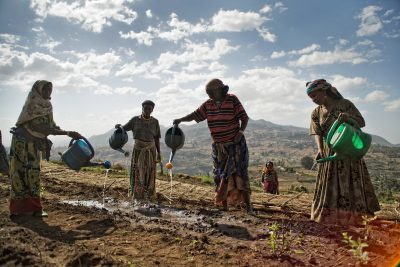By
Adisa Amanor Wilks
In some sense Africa is already experiencing a change in climate. From an increasingly erratic and unpredictable weather pattern in recent times, to recent floods in Burkina Faso and a prolonged drought in Ethiopia, all can be attributed to a change in climatic conditions, and pose significant threats to food security and livelihoods in Africa.
Climate change is becoming a major challenge to agriculture development.
Agriculture still remains one of the main employment sectors in Africa. More than half (65%) of the continent’s population is employed in the agricultural sector, half of whom are women.
The impacts on Africa’s agriculture cannot be ignored. The UN FAO’s Intergovernmental Panel on Climate Change 2007 report estimates that “Africa will be the most vulnerable to climate change” due to “poor infrastructure, poverty and governance.”
The World Bank predicts that by 2080, Sub-Saharan Africa will become the most food insecure region in the world, surpassing Asia – almost half of global undernourished people will be living in Africa.
From nutrition and livelihoods to food security, climate change undoubtedly presents a major threat to millions of Africans. If no sustainable strategies are put in place the region will remain vulnerable to the predictable effects of climate change.
This is why civil society groups, NGOs and other governmental bodies from Africa presented strong arguments at the recently ended COP21 event in Paris.
“Collaboration by various stakeholders including governments, NGOs and research bodies is needed now to rapidly scale-up the African agricultural sector to improve food security and resilience to climate change,” said Mrs Estherine Fotabong, NEPAD Programmes Director.
There are many initiatives that have been piloted to fight climate change in Africa. Some of them are aimed at boosting resilience and livelihoods through smart approaches. One such effort is NEPAD’s Climate Smart Agriculture (CSA).
Launched in 2014, the CSA is expected to improve productivity, resilience and adaptation, as well as contribute towards the reduction of greenhouse gas emissions. When fully implemented, the smart initiative should lead to overall food security and nutrition in the face of climate change.
The goal is to reach 25 million African farmers, introducing them to sustainable agriculture by 2025.



No Comments Yet!
You can be first to comment this post!